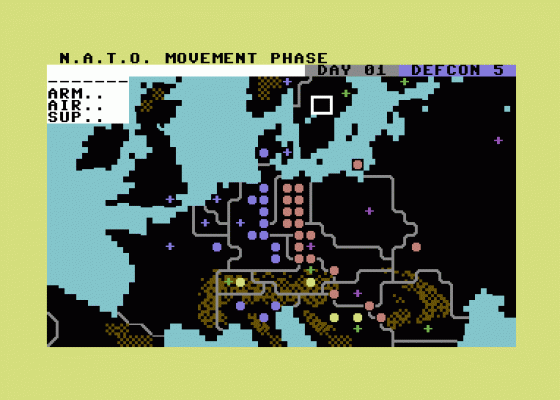Remarkable new simulation of east/west conflict
Theatre Europe
Remarkable new simulation of east-west conflict
Gold, grim nuclear reality. That's what this game is about. This new approach to a war game brings home the horrors of a global nuclear holocaust. Here though it's up to you to stop it from happening.
Although this is essentially a war game it uses a series of different screen types to depict the action in an atmospheric, nail-biting way - and there are also a couple of actual arcade action screens.
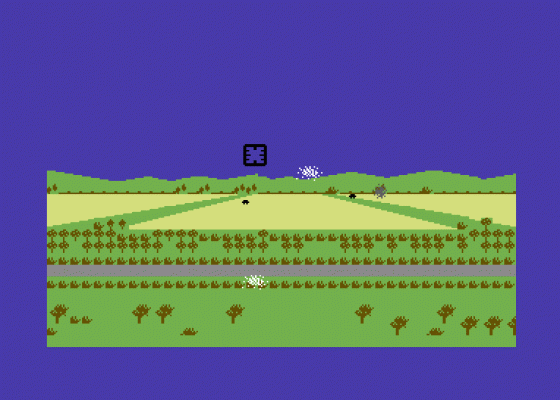
The game starts with an absolutely magnificent and appropriate piece of music - the Lennon/McCartney sound 'Give Peace A Chance'. This, coupled with a pledge in the instructions that the game is dedicated to peace, give it a superbly sober atmosphere from the start.
You then have several selections to make:
1. one of three levels against the computer 2. whether you want to command the NATO forces or the Warsaw Pact 3. whether you want to include the arcade sequences
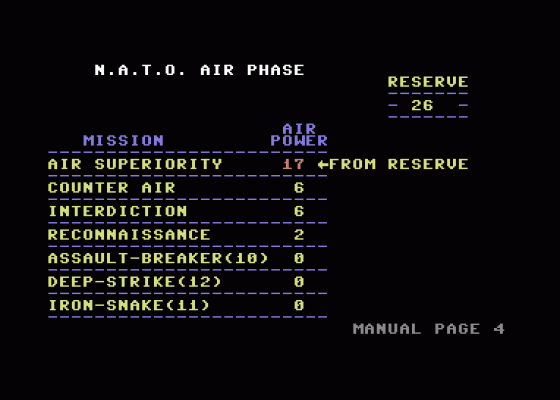
Next you will be presented with a detailed map of Europe and western Russia (including Moscow). The map shows mountain ranges, capital cities, country borders and all the armed forces of both sides.
First you have the option to MOVE your units. Simply place your box-like cursor over the desired unit, press Fire button and then move the cursor to where you'd like the unit to move to. You can only move one character space at a time and the unit will move as soon as you press the Fire button again.
Next comes ATTACK. This has exactly the same sort of control as moving, this time positioning the cursor over the enemy unit you'd like to attack. Once a unit is sent into battle it cannot be halted until your turn is over.
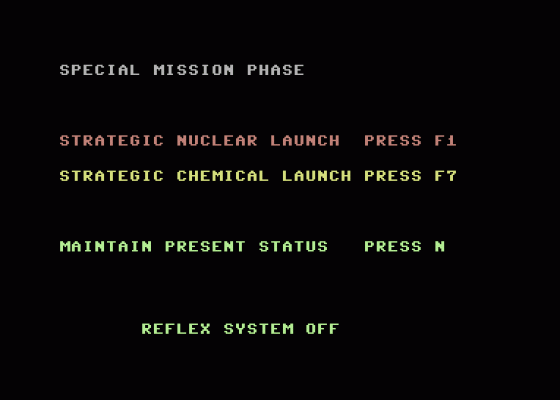
When all attacking forces are in operation you can FIGHT. If you have selected the action screen mode then you can choose which battle you'd like to take part in. You are then engaged in an arcade-type shoot-'em-up. If you've decided to leave the action screens out then the battle will be decided on merits of air superiority, supplies and armament.
After the battle, you can REBUILD your units with somewhat scant supplies. Firstly you are given a quantity of armament supplies - these can be issued to the more desperate forces by positioning the cursor over the unit and pressing Fire a certain number of times according to how many supplies you want sent. As with every type of limited and have to be used wisely.
Once rebuilding has finished you move onto the AIR phase. This is to determine how you're going to use your air command during the next go. You have spare aircraft which you can access, but which will run out if you use too much. There are several options which you can allocate these to, some essential and some tactical.
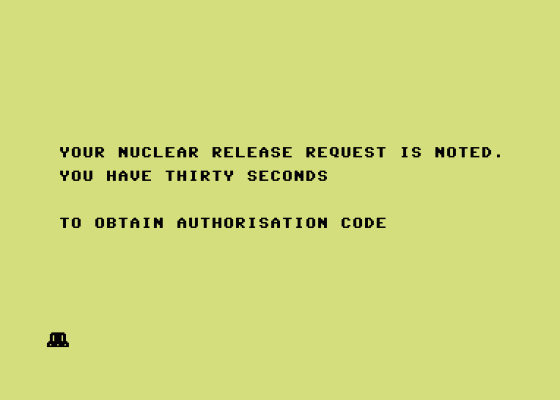
Essential options are air power (the most important), counter air strikes and reconnaissance. Other options include interdiction, assault breakers, deep strike and iron snake.
COUNTER AIR STRIKES are attacks on enemy airfields and bases, this will all help in the overall battle for air superiority.
INTERDICTION is sending planes behind enemy lines to attack the enemy supply and movement network. It has a minor risk of setting off a nuclear strike.

The other three are respectively an attack on one particular unit (high success rate), a strike into enemy territory and an attack on railways to disable enemy reinforcements.
Finally you have the option to use a Special Mission, basically setting off a strategic chemical or nuclear launch.
After you go, it's the computer turn and it'll take its go in exactly the same way as you. This time, though, it'll fire any special missions at the beginning of its move.
The Computer's Three Skill Levels
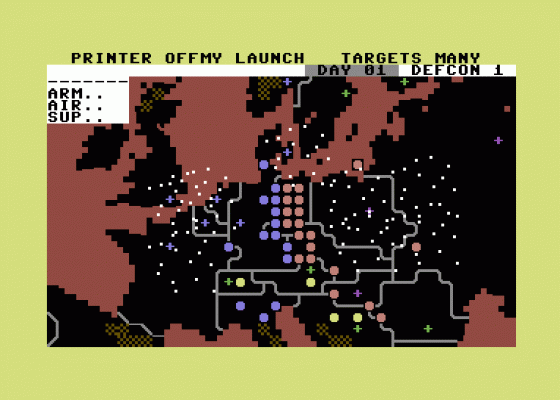
There are three computer levels, each with its own characteristics. Each new level plays an increasing standard of conventional warfare plus more underhand tactics.
On level one the computer will play a totally conventional war game and unless provoked will not use the nuclear or chemical option.
On level two and three the computer will use nuclear and chemical options to prevent you winning the game. Especially level three which plays a highly intelligent and unpredictable game. Nuclear escalations on this level are usually enormous. *You have been warned*.
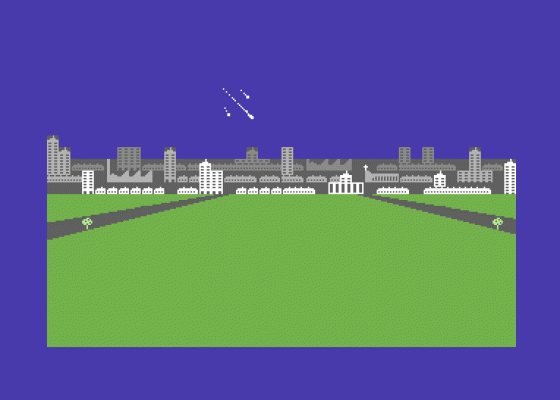
With levels two and three there are some new options which don't exist on the first level. Usage of tactical chemical weapons in standard warfare is allowed. This gives an attacking unit far greater effectiveness. Once used, it is in constant use throughout the game.
If you are commanding the Warsaw pact then on the high levels, special units are made available to you. These are the 1st Airborne Army and the 1st Amphibious Army. The former can be flown directly behind enemy lines whilst the latter can move over the sea to a tactical attack point.
The Arcade Screens
At the start of the game there is an option: choose whether you'd like action screens or not. (Serious wargamers should not take this option).
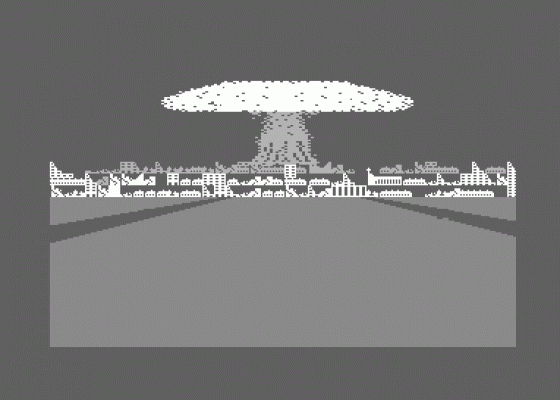
When you attack or are under attack you are asked to select a battle. Move the cursor over the desired unit and a picture of a plain with mountains in the background will be presented on screen with planes, helicopters and tanks moving about.
A target cursor is under your control in Missile Command style and you use this to destroy the enemy.
The tanks which trundle up and down the road in the foreground are your forces. Be careful not to hit them as they fire at the planes too and can bring them down.
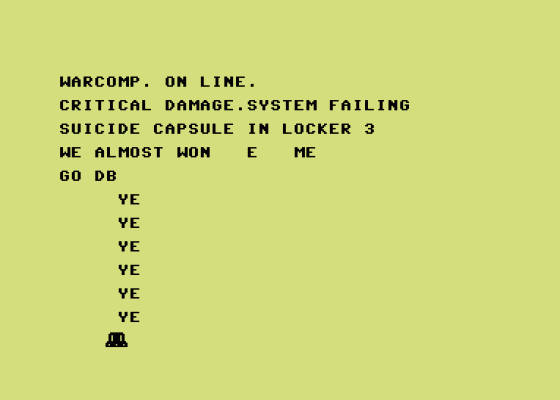
How well you do on this screen - i.e. how many tanks and planes you destroy with how many missiles - plays a major part in the game. Your performance is taken into consideration as a strength factor deciding the fate of your forces elsewhere. So if you do badly in this phase then expect severe losses all round.
Starting A Nuclear War
The most controversial part of the program involves the use of chemical and nuclear weapons. You are given the option of selecting these 'special missions' at the end of each turn.
A CHEMICAL LAUNCH is automatically targeted on an enemy supply city. A special readout will give you the details and expected results. It will also tell you the results of the attack. Using the mission carries the risk of an enemy nuclear response.
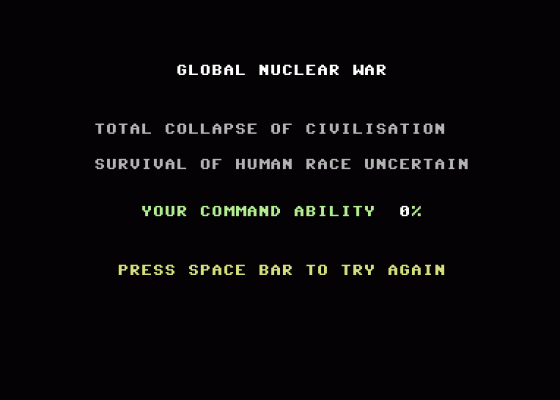
A STRATEGIC NUCLEAR ATTACK involves some nailbiting and tense moments. When you first switch to nuclear mode you are given 30 seconds to ring a phone number and obtain a special authorisation code. This is a real number, 0203 668405, contactable 24 hours a day.
If you enter the correct code number (it's always the same) then you are allowed direct control over all targeting and warheads. There are three separate settings:
1. Standby, which you revert to if you decide against a launch. 2. Strategic launch, in which a single nuclear strike can be targeted on an enemy city or unit. Enemy reaction will be severe. 3. Fire-Plan, a full-scale strike. This should *never* be used. Retaliation is extreme beyond measure.
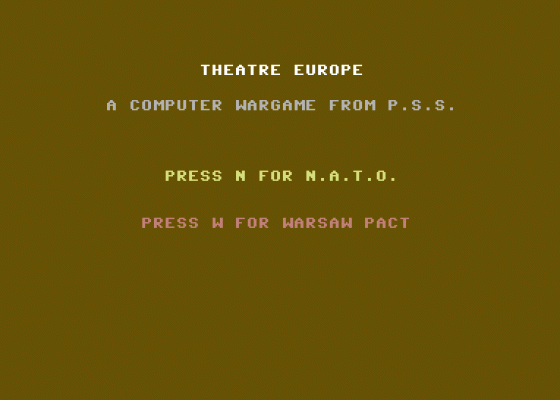
Targeting a single nuclear or chemical launch is alarmingly simple. You are given control of a cursor which you can position over the desired target. Press Fire and the rest is done automatically.
When under enemy nuclear attack, a launch will be detected and a large Impact Predictor cursor will precede the target cursor. If you have an option called 'reflex system' switched on, your forces will automatically launch a strike of similar size. There is nothing you can do but watch the targets destroyed in a chilling sequence of graphic screens.
As you play this game, it becomes increasingly clear that the war cannot be won with nuclear weapons. Only lost.
Why The Figures Were Fiddled
Developing Theatre Europe gave experienced war games programmer Alan Steele one of the frights of his life. It happened as the game reached completion. He and the rest of the PSS team had done extensive research into the relative strengths of the NATO and Warsaw Pact forces, including contacts with the Ministry of Defence and the Soviet embassy in London.
With the information, they programmed in the figures and then let the computer play itself to see what happened. The result was chilling. Every time the communist forces scored an overwhemling victory, leaving Nato with the stark option of using nuclear option of using nuclear weapons, or allowing West Germany to fall.
Alan says the experience had a big impact on him. "For a long time I'd wanted to write a war game based on the current situation in Europe to see what would happen. I didn't start out with any axe to grind, we just took the program and put in the most reliable information we could get. I find the result very disturbing - after all it's NATO's avowed policy to go nuclear if its conventional forces cannot hold back the Warsaw pact forces in a future war."
The superiority of the Warsaw Pact was so great that PSS have actually had to fiddle the figures in the version of the program that's been released. Otherwise, they say, it wouldn't make a reasonable game - the same side would always win.
Alan himself strongly hopes that his program will encourage people to work for peace. "I think it's a crying shame that there are so many problem in the world and all we can do is sit back and build nuclear weapons because we mistrust each other."
BW
This triumph of gaming and common sense should prove the most popular war game yet. It has the atmosphere and action appeal to attract many who may have disliked war games up to now. The political angle has been struck just right so that the program presents a realistic simulation that actively discourages nuclear war.
Needless to say, the mindless blasters should steer clear of this game, because it's got a conscience. Everyone else will love it.
GP
The atmosphere generated by this excellent game is incredible, and virtually unrivalled by anything else available on the C64. Using the unpleasant and horrific subject of nuclear war, for the purpose of a game, may appear distasteful to some.
But on playing it will seen that, as in real life, the use of nuclear weapons for the purpose of winning a war, is a futile one and gains nothing.
JR
I was amazed: me, a war games hater loving a war game. It must be special and it is. The combination of the most tense and atmospheric screens yet seen on the C64 with a simple-to-use, yet complex war game is stunning.
Although the game is controversial it in fact makes clear the horrors of a nuclear conflict. The graphic details of the outcome of a nuclear war in Europe was a far cry from the 'blast the Commies' tone of other games.
Verdict
Presentation 96%
The large package has an excellent instruction booklet, glossy map.
Graphics 71%
Certainly better than most war games!
Sound 89%
Effective noises plus one of the best pieces of micro music ever.
Value For Money 94%
If you're strong enough to grapple with the alarming game concept, you'll find this one very, very special indeed.
Originality 84%
Certainly not just another war game.
Hookability 96%
Be careful. The effect this game can have on you is alarming.
Lastability 95%
All three levels are very different and you can play either side.
Overall 89%


 1st June 1985
1st June 1985